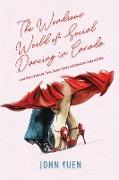- Start
- The Wondrous World of Social Dancing in Canada
The Wondrous World of Social Dancing in Canada
Angebote / Angebote:
Dance instructor and journalist John Yuen details for the first time how Canadians who dance for social reasons have made a phenomenon of our times: a fun activity, exceptional exercise, spiritual awakening, and a therapeutic medium. The Wondrous World of Social Dancing in Canada: Come Dance Ballroom, Salsa, Square-Dance and Argentine Tango with Me! takes a deep dive into the social dance subculture to show the true nature of Canadians' interplay with four popular dance styles that are sweeping the world. The book is an easy read containing chapters on the history of social dancing in Canada. As a starter. it pulls back the curtain to trace the beginning of social dancing from 1605 when the first colony of New France was established by the French, and subsequently by the British and other European settlers. It is made clear that social dancing actually began centuries earlier with the Indigenous people. Good descriptions of why Indigenous peoples danced (and still do) for reasons beyond "social". The first chapter explains how they dance historically for religious and ceremonial reasons as well. On the other hand, readers will learn that the successive waves of colonists danced socially--to forget how they have to toil to survive the wilderness that has been Canada for many, many generations. The chapter concludes with the effects on dancers and dance schools with the beginning of the COVID-19 pandemic. The second chapter covers the emotional and physical reactions of dancers as participants in ballroom/Latin, salsa, square-dancing and Argentine tango. They tell stories about how and why they started dancing, their perception of theways their teachers instruct, their "best practices" in practicing their steps outside the classroom, and what were the best experiences they have had on the social dance floor. Chapter three examines the role of dancing by persons with Parkinson's disease (PD) in relieving their physical symptoms and reducing physical isolation. Several interest groups such as the National Ballet of Canada have stepped up to theplate to help. Partnering with one another, the groups have particularly focused on Argentine tango as the main delivery mechanism to help persons with PD. There is a section that features two Nova Scotian couples who have enjoyeda certain degree of success in curbing the discomforts associated with PD. The last chapter offers a detailed look at the social dancing industry: the background of studio and club owners and their instructors in the four dance genres. A notable aspect of the dance academies is that the instructors reflectthe diversity of the Canadian multi-cultural population. Competitive dancing which is a representation of social dancing receives kudos from Canadians across the country in a special column called "39 Opinions." For example, a male social dancer from Nova Scotia wrote "I've enjoyed seeing amateur dancers of limited skill improve in their ability, often to a level that looks quite polished. Such improvements are usually the result of determination, coaching and practice." One female dancer in Ontario, Canada's most populous province, remarked: "I love watching it. It's a combination of things. So, it's beautiful in terms of the mood and theirbodies, especially some of the Latin stuff. Just phenomenal. I love the costumes, the theatricality of it.
Folgt in ca. 10 Arbeitstagen
